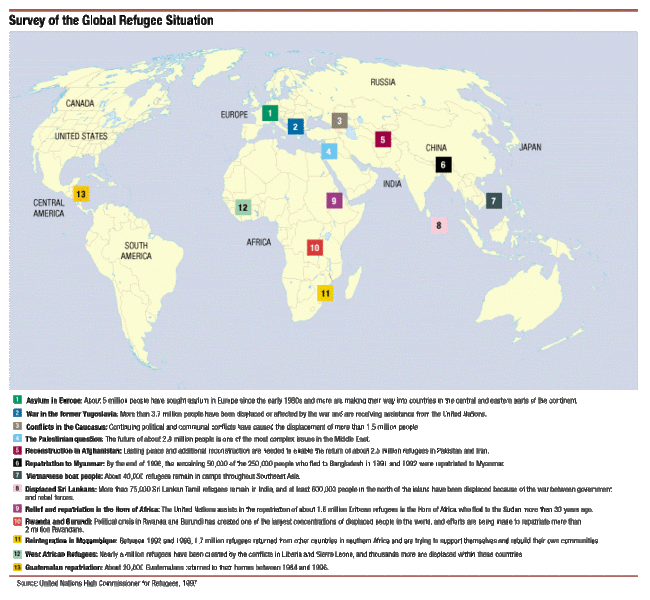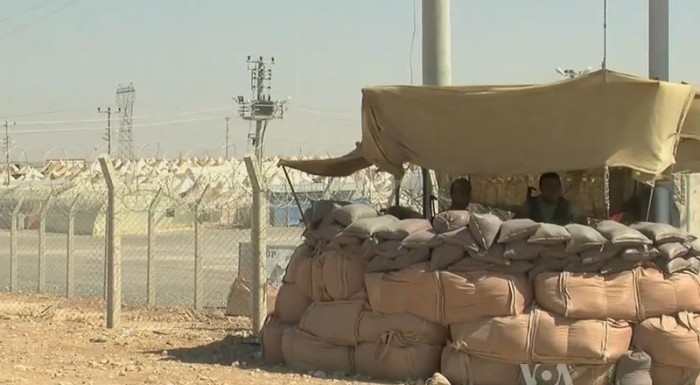Policy makers’ interests can be diametrically opposed to those of refugees. Academic research offers important space to step back from the emergency and think beyond the narrow confines of the politically possible, argues Katy Long for Refugee Week.

Survey of the global refugee situation, 1997.
This image is attributed to the Institute for National Strategic Studies (INSS.) As the work of a U.S. military or Department of Defense employee, taken or made as part of that person’s official duties and as a work of the U.S. federal government, the image is in the public domain.
‘And what do you do?’ I’ve just moved 5,000 miles from Oxford to San Francisco and every day brings new introductions – and another neighbour asking this question. On the verge of taking at least a temporary break from formal full-time academia, I can no longer rely on answering ‘I’m a lecturer’. It’s a job title that leaves no one any the wiser as to what I actually do, but it’s a convenient way to avoid answering a much harder question.
Now I find myself struggling to find the right words. In lecture halls and at conferences, I tell students and colleagues that I ‘work on refugees’: but there’s something deeply jarring in the scientific refashioning of living human beings into academic specimens. Refugees don’t want peer-reviewed papers and Foucauldian analyses of power as much as they want advocates to fight against injustice, and as much as they need jobs and education. As my refugee research assistants in Uganda constantly reminded me, it’s hard to take the long view when you are displaced now.
A scan through academic journals presents articles about the bodies of dead migrants in the Mediterranean and Somalis being forcibly driven home; you begin to wonder whether all the research in the world could ever make up for a lack of political will.
Am I just another academic indulging in a bout of existential angst? Possibly. But, as the first Oxford Handbook on Refugee and Forced Migration Studies hits the shelves this month, the work of myself and colleagues at leading UK universities, I’d argue that my struggles to define what exactly my work means reflects a broader dilemma confronted, at some point, by the majority of students, researchers and scholars who have choose to see themselves as working in “Refugee Studies” – rather than just studying refugees. It raises a broader question, recently touched upon by Tom Vickers and Hannah Lewis on these pages, about what the real value of academic research is.
Refugee Studies emerged as a distinct entity in the 1980s, propelled by activism as well as academia. Its elder statesmen and stateswomen – figures such as Barbara Harrell are Arthur Helton – are and were humanitarians and refugee advocates as much as scholars. Today’s researchers still recognise the “dual imperative” to ensure their research not only fulfils scholarly expectations, but speaks to refugees’ plight too. Yet in an age when academic careers are forged – or broken – on the back of citation indexes and peer-reviewed research grants, is it really still feasible to do both well?
University’s management teams might retort that when survival depends upon student numbers, it’s not only feasible but also imperative to appeal to humanitarian instinct, even at the expense of intellectual rigour. There are no shortage of idealistic young twenty-somethings who will pay good money to sit in a classroom in the belief that an MSc will help in that pursuit. In 2011, preparing to pitch the Handbook to Oxford University Press, myself and co-editors counted over 160 courses in the UK alone that involved some study of migration or displacement.
It is undoubtedly a privilege to teach these students – bright, committed and often outraged at the injustices so many forced migrants face. And humanitarianism is an easy sell: refugee crises are immediate, urgent, shocking. Students want to do something: the vast majority are desperate to get into “the field”, to not just write about the problems being faced now in Syria, Somalia, South Sudan but to work there, now.

Syrian refugee center on the Turkish border (3 August 2012).
This image is attributed to Voice of America News: Henry Ridgwell on Turkish border, “Refugees Flee Aleppo; Hot, Barren Turkish Camps Await”. It is in the public domain in the United States because it is a work prepared by an officer or employee of the United States Government as part of that person’s official duties under the terms of Title 17, Chapter 1, Section 105 of the US Code.
But I’ve increasingly come to think the real value of Refugee Studies lies in the opposite – in taking a few months to interpret the world, so that you know how it needs to change, rather than just “doing” policy. It might feel counterintuitive, but I’d argue the real value of academic Refugee Studies is the space it offers to step back from the emergency.
If you’re interested in understanding identity, human rights or citizenship – if you want to grapple with the questions at the centre of social science about justice, fairness and freedom – documenting the experiences of refugees and forced migrants is a perfect place to begin. There is no doubting the relevance of refugees’ lives – and of migration more generally – to wider scholarship, and in recent years growing numbers of researchers have chosen to anchor themselves in terms of their discipline rather than their interest in displacement. Part of this shift is a reflection of wider structural change. Forging successful academic careers depend ever more on publications records and research grant success. Inter-disciplinary, topic-focused research can easily fall into Research Council cracks.
However, while refugee “mainstreaming” has undoubtedly established the study of refugees as a legitimate intellectual pursuit, it raises new questions about the place and purpose of “Refugee Studies” – and arguably risks pushing refugees’ own voices to the margins of research. Policy makers certainly decry this perceived shift among academics towards the pursuit of more abstract, intellectual concerns. What these groups want is research reworked into accessible chunks: real-time evaluations, policy briefs, talking points. And in an academic world increasingly dependent upon soft money, donor governments and their partners have deep pockets: the reality is that it’s this money that enables some research to happen at all.
Nevertheless – as researchers like Nicholas Van Hear and Oliver Bakewell have argued – there is also a real danger that in allowing policy-makers to not just enable but to set research agendas, Refugee Studies risks becoming a mere policy-adjunct. And policy-makers interests are not necessarily the same as refugees’ interests –sometimes they are diametrically opposed.
In this context, what can we expect to be the future for Refugee Studies? Is the likely outcome a retreat of the intellectuals into Sociology and Political Science departments, and the defection of pragmatists into research-lite think-tanks and evaluation units? I hope not, for I think – as is so often the case when it comes to migration – the best conversations happen at the borders of these two worlds. This is when policy-makers are challenged to think beyond the narrow confines of the politically possible, and academics have to consider real-world relevance. Refugee Studies is ideally positioned to be this space: and to put refugees’ voices at the centre of these conversations.
The Handbook seeks to be an new accessible resources that opens up existing research on refugee and forced migration issues to people who won’t read peer-reviewed journals, but who want more than bullet points: who want to do, but also want to think. It brings together contributions from fifty leading academics to create the first fully comprehensive overview of Refugee Studies today. It seeks to respond to the very real challenge of how Refugee Studies can best encourage dialogue between academics and policymakers and also invite them to shift between University and policy worlds. For if Refugee Studies is in part about looking beyond borders then the choice should to think or act should not be seen in absolute terms as either/or.
If Refugee Studies becomes ‘a purely intellectual pursuit, divorced from the human realities of displacement and dispossession’, it will lose much of its identity – and its value. But, Refugee Studies matters most when it uses this considerable academic resources to ask searching questions – about the ethics of detention and deportation; about what “home” really means for an Afghan refugee who has lived all her life in Pakistan. A vibrant and engaged community of scholars cannot atone for the failure of politics: but it can ensure that those failures – and the long decades spent by refugees waiting in vain for a solution – are not forgotten.
This article was written by Katy Long, a lecturer in development studies at the University of Edinburgh who specializes in migration, and was published on opendemocracy.net under a Creative Commons Attribution-NonCommercial 3.0 licence.
Tags: Activism, Adult education, Civil society, Conflict, Policy, Teaching
